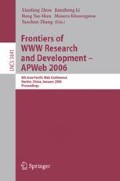Abstract
This paper focuses on a system framework supporting personalized learning. While learning styles describe the influence of cognitive factors, learning orientations describe the influence of emotions and intentions. The system responds to students’ needs according to their learning orientations.
Such a system requires cooperation among several educational organizations, since it is quite difficult for a single organization to develop an item pool of questions tailored for individuals with different learning orientations. The cooperation needs serious consideration of security issues. We propose a model for sharing protected Web resources that secures privacy.
Access this chapter
Tax calculation will be finalised at checkout
Purchases are for personal use only
Preview
Unable to display preview. Download preview PDF.
References
Aleven, V., Koedinger, K.R.: Limitations of Student Control: Do Student Know when they need help? In: Gauthier, G., VanLehn, K., Frasson, C. (eds.) ITS 2000. LNCS, vol. 1839, pp. 292–303. Springer, Heidelberg (2000)
Baker, F.: The Basics of Item Response Theory. ERIC Clearinghouse on Assessment and Evaluation, University of Maryland, College Park (2001)
Baker, R.S., Corbett, A.T., Koedinger, K.R.: Detecting student misuse of intelligent tutoring systems. In: Lester, J.C., Vicari, R.M., Paraguaçu, F. (eds.) ITS 2004. LNCS, vol. 3220, pp. 531–540. Springer, Heidelberg (2004)
Beck, J., Stern, M., Haugsjaa, E.: Applications of artificial intelligence in education. ACM Crossroads, 11–15 (1996)
Birenbaum, M.: Assessment 2000: towards a pluralistic approach to assessment. In: Birenbaum, M., Dochy, F.J.R.C. (eds.) Alternatives in assessment of achievements, learning processes and prior knowledge. Evaluation in education and human services, pp. 3–29. Kluwer Academic Publishers, Boston (1996)
Bloom, B.: The 2 sigma problem: The search for methods of group instruction as effective as one-to- one tutoring. Educational Researcher 13(6), 4–16 (1984)
Brusilovsky, P.: Adaptive and intelligent technologies for Web-based education. Special Issue on Intelligent Systems and Teleteaching 4, 19–25 (1999)
Bush, M.: A multiple choice test that rewards partial knowledge. Journal of Further and Higher Education 25(2), 157–163 (2001)
Butz, C.J., Hua, S., Maguire, R.B.: A Web-Based Intelligent Tutoring System for Computer Programming. In: IEEE/WIC/ACM Web Intelligence conference, pp. 159–165 (2004)
Conati, C., Gertner, A., VanLehn, K.: Using Bayesian networks to manage uncertainty in student modeling. User Modeling and User-Adapted Interaction 12(4), 371–417 (2002)
Dunkin, M.J., Barnes, J.: Handbook of Research on Teaching, NY (1986)
Farnsworth, C.: Using computer simulations in problem-based learning. In: Orey, M. (ed.) Proceedings of the Thirty-Fifth ADCIS Conference, pp. 137–140 (1994)
Johnson, W.L.: Pedagogical agents for Web-based learning. In: First Asia-Pacific Conference on Web Intelligence, p. 43 (2001)
Hron, A., Friedrich, H.F.: A review of web-based collaborative learning: factors beyond technology. Journal of Computer assisted Learning 19, 70–79 (2003)
Koedinger, K.R., McLaren, B.M., Roll, I.: A help-seeking tutor agent. In: Lester, J.C., Vicari, R.M., Paraguaçu, F. (eds.) ITS 2004. LNCS, vol. 3220, pp. 227–239. Springer, Heidelberg (2004)
Lepper, M.R., Woolverton, M., Mumme, D., Gurther, G.: Motivational techniques of expert human tutors: Lessons for the design of computer-based tutors. In: Lajoie, S.P., Derry, S.J. (eds.) Computers as cognitive tools, LEA, Hillsdale, NJ, pp. 75–105 (1993)
Liu, C., Zheng, L., Ji, J., Yang, C., Li, J., Yang, W.: Electronic homework on the WWW. In: First Asia- Pacific Conference on Web Intelligence, pp. 540–547 (2001)
Martinez, M.: Adaptive Learning: Research Foundations and Practical Applications. In: Stein, S., Farmer, S. (eds.) Connotative Learning. IACET, Washington D.C (2004)
Martin, J., Vanlehn, K.: Student assessment using Bayesian nets. International Journal of Human- Computer Studies 42, 575–591 (1995)
Merceron, A., Yacef, K.: A Web-based Tutoring Tool with Mining Facilities to Improve Learning and Teaching. In: Verdejo, F., Hoppe, U. (eds.) Proceedings of 11th International Conference on Artificial Intelligence in Education. IOS Press, Amsterdam (2003)
Pecheanu, E., Segal, C., Stefanescu, D.: Content modeling in Intelligent Instructional Environment. In: Luo, Y. (ed.) CDVE 2004. LNCS, vol. 3190, pp. 1229–1234. Springer, Heidelberg (2004)
Renkl, A.: Learning from worked-out examples: Instructional explanations supplement self- explanations. Learning and Instruction 12, 529–556 (2002)
Schworm, S., Renkl, A.: Learning by solved example problems: Instructional explanations reduce self-explanation activity. In: Gray, W.D., Schunn, C.D. (eds.) Proceeding of the 24th Annual Conference of the Cognitive Science Society, pp. 816–821. Erlbaum, Mahwah (2002)
Shute, V.J., Glaser, R.: Large-scale evaluation of an intelligent tutoring system: Smithtown. Interactive Learning Environments 1, 51–76 (1990)
Wood, D.: Scaffolding, contingent tutoring, and computer-supported learning. International Journal of Artificial Intelligence in Education 12, 280–292 (2001)
Author information
Authors and Affiliations
Editor information
Editors and Affiliations
Rights and permissions
Copyright information
© 2006 Springer-Verlag Berlin Heidelberg
About this paper
Cite this paper
Encheva, S., Tumin, S. (2006). Automated Discovering of What is Hindering the Learning Performance of a Student. In: Zhou, X., Li, J., Shen, H.T., Kitsuregawa, M., Zhang, Y. (eds) Frontiers of WWW Research and Development - APWeb 2006. APWeb 2006. Lecture Notes in Computer Science, vol 3841. Springer, Berlin, Heidelberg. https://doi.org/10.1007/11610113_46
Download citation
DOI: https://doi.org/10.1007/11610113_46
Publisher Name: Springer, Berlin, Heidelberg
Print ISBN: 978-3-540-31142-3
Online ISBN: 978-3-540-32437-9
eBook Packages: Computer ScienceComputer Science (R0)

